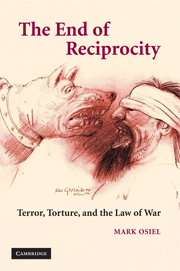Book contents
- Frontmatter
- Contents
- Introduction
- PART ONE RECIPROCITY IN HUMANITARIAN LAW
- PART TWO THE ETHICS OF TORTURE AS RECIPROCITY
- PART THREE RECIPROCITY IN THE SOCIAL SCIENCE OF WAR
- 8 Reciprocity as Civilization: The Terrorist as Savage
- 9 The Inflationary Rhetoric of Terrorist Threat: Humanitarian Law as Deflationary Check
- 10 Reciprocity as Tit-for-Tat: Rational Retaliation in Modern War
- 11 The “Gift” of Humanitarianism: Soft Power and Benevolent Signaling
- PART FOUR THE END OF RECIPROCITY
- Conclusion
- Acknowledgments
- Notes
- Index
8 - Reciprocity as Civilization: The Terrorist as Savage
Published online by Cambridge University Press: 05 June 2012
- Frontmatter
- Contents
- Introduction
- PART ONE RECIPROCITY IN HUMANITARIAN LAW
- PART TWO THE ETHICS OF TORTURE AS RECIPROCITY
- PART THREE RECIPROCITY IN THE SOCIAL SCIENCE OF WAR
- 8 Reciprocity as Civilization: The Terrorist as Savage
- 9 The Inflationary Rhetoric of Terrorist Threat: Humanitarian Law as Deflationary Check
- 10 Reciprocity as Tit-for-Tat: Rational Retaliation in Modern War
- 11 The “Gift” of Humanitarianism: Soft Power and Benevolent Signaling
- PART FOUR THE END OF RECIPROCITY
- Conclusion
- Acknowledgments
- Notes
- Index
Summary
Victorian jurisprudents deemed a country's “civilized” and eligible for membership in international society if it demonstrated a capacity for reciprocity in its international relations. Civilizations incapable of reciprocity with others were “barbaric.” Islamic peoples were more suspect than Buddhists or Confucians in this respect, one major legal thinker contended, because ‘the moral code of the Koran is at the same time a code of international law…one that prohibits relations of equality and reciprocity between the house of Islam and infidel countries.”’ Conversely, critics of colonialism invoked the rhetoric of reciprocity against the West itself, observing for instance that since Britain required Turkish citizens to submit to British law when in the West, Turkey could legitimately apply its own law to visiting Westerners, a practice that certain Western states then resisted. Britain's failure to reciprocate revealed its flagrant hypocrisy and disrespect for Islam, argued Italian Antonio Gallenga in 1868.
The terms of that antique debate resonate today and may seem, in fact, little changed. “Postcolonialism” is a particularly influential current in contemporary analysis of relations between the Western and non-Western worlds. Critics of the Enlightenment have long viewed its alluring dream of human liberation as leading to new forms of enslavement, substituting one mythology or superstition for another. In this spirit, postcolonial critics now rightly caution the West about the danger of conceiving “the Muslim terrorist” in much the same way it earlier conceived the Indian “savage” and, more generally, the Oriental Other.
- Type
- Chapter
- Information
- The End of ReciprocityTerror, Torture, and the Law of War, pp. 221 - 243Publisher: Cambridge University PressPrint publication year: 2009

